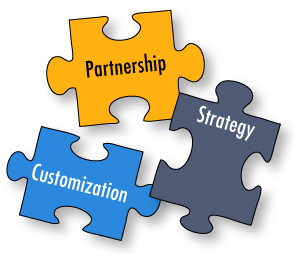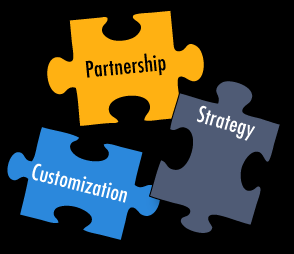This is an inherently confusing topic. Most people aren’t aware of all that is tied to this decision, especially if you're embarking on a new solution or considering an overhaul of an existing system. There is so much noise out there talking about the pros and cons of open source, v. hosted solutions. Somewhere along the way ‘proprietary’ became a 4 letter word. Many people rely on professionals they trust. Yet with all the information and misinformation out there, one can feel lost.
First off, there is no one size fits all CMS on the market. While Wordpress is the ubiquitous choice on the internet, with anywhere from 50% - 60% market share depending upon the source, it clearly has its challenges. (BuiltWith https://trends.builtwith.com/cms pegs this number at 50% for the entire Internet.) This high adoption is for good reason. It's free, relatively user friendly, often taught to developer students and benefits from strong community support. Did I mention it’s free? For many, it feels like a safe choice. That does not mean its always the right choice.
Building a site that includes a large, complex, expensive web platform for a company that is handling huge user volumes, secure transactions, 3rd party software integrations, dynamic content and secure environments requires a platform that can support these needs. It's a puzzle that, if missing a few pieces, won't operate optimally and ultimlately be a waste of time, resources and budget. Then again the average hobby blogger needs much less to successfully operate. The point here is that an ecosystem of CMS options exists for good reason. Options should be considered when heading down this path.
Below are 8 topics we focus on when helping clients complete the puzzle of determining the optimal technology recommendation based upon client need:
 - Partnership: Unless you plan to build and maintain a site yourself, for your company, you are relying upon a partnership with other humans to deliver a technology solution. Typically, an organization would rely upon an employee or contractor to deliver the solution. If you go with an employee, what happens should they leave the company? If you rely upon a contractor, do you feel good about the long term relationship with the contractor team? How long have they been in business? What does turnover look like within the company, especially those charged with managing your account? How are they investing in their team and community? Do you align with their company values? Do you trust that the team has the technical knowledge and curiosity to compliment knowledge of your industry in order to meet your needs?
- Partnership: Unless you plan to build and maintain a site yourself, for your company, you are relying upon a partnership with other humans to deliver a technology solution. Typically, an organization would rely upon an employee or contractor to deliver the solution. If you go with an employee, what happens should they leave the company? If you rely upon a contractor, do you feel good about the long term relationship with the contractor team? How long have they been in business? What does turnover look like within the company, especially those charged with managing your account? How are they investing in their team and community? Do you align with their company values? Do you trust that the team has the technical knowledge and curiosity to compliment knowledge of your industry in order to meet your needs?
- Strategy: A big part of any partnership is the the ability for your chosen provider (employee or contractor) to distill an organization’s complex needs down to something clear and simple. In the same way that you do not break ground on a new home before having clear blueprints; investing in discovery, strategy and planning for a new site is something we encourage prospects and clients to consider. Some web needs are quite simple to begin with. Others involving complex 3rd party software integration, complex marketing KPI’s and automated business processes require careful planning to maximize chances of the solution succeeding.
- Customization: This word has can be scary to some. It suggests unique, one-off, non-standard. While this can be true, aren’t most companies unique and non-standard? Doesn’t your business stand for and pursue something different than everyone else in the market? I am not suggesting that creating a website from scratch makes any sense in this day and Internet age. That said, a site that has the ability to do exactly what you need could help with this differentiation online. I have not experienced very many clients that like to here, “Sorry, your CMS just can’t accommodate your request.” More importantly, if a site is customized, can it scale over time? We often see sites that resemble a bowl of spaghetti when audited. Maybe a custom feature was included in the site, but the notion of evolving that feature to meet unknown future needs proves unrealistic given the hacks used to support its creation. It's like an old home that has been remodeled several times and results in Pandora’s Box for the new owner excited to enhance the home.
- Scalability: Closely tied to customization is scalability. While many sites have a clear use case and defined timeframe…think political campaign site…many are the online hub for an organization. Like the organization, the web solution will need to change over time. Are you investing in a solution that can support those known and unknown needs over time? While it can be great business for a web shop to build and toss out sites over a period of years at the client’s expense, it's not a very efficient use of company resources. Finding the right development framework to support your expected future needs is critical. An example here is that several cascade clients have wanted to keep hosting and development costs low. So we put them on a lightweight, inexpensive platform like SquareSpace. This met budget goals, but fell short on scope needs beyond the initial launch. Now the client had to determine how long to use the site before scrapping it and starting over. At least at this point, the partnership and clarity of needs allowed our team to move efficiently in a new direction. This was a cost of time and money, though.
- Security: While not the most exciting topic out there, this one cannot be ignored. If a site is not protecting its users, it's clearly failing. What protocols are in place. Is there monitoring software set up to identify concerning activity? Are 3rd party scans being done to test the effectiveness of measures in place? Does your site need to be compliant to certain standards like HIPPA, PCI or others?
- Performance: Ever click on a site and have to wait an exorbitant amount of time for it to load. This can be caused by any number of things, but nobody wants it to be due to a site that is slow to render. Expectations around page load times are getting more unrealistic by the day. So not only does your site need to function, it needs to do so consistently fast. If you are relying on a collection of plugins or functions that take time to render a site, you’ve already lost. Is your site using elegant code that will deliver on the promise, quickly? Is your server environment optimized to handle spikes in activity without bogging down? Is your site in a shared environment that protects it from other sites on the server?
- Lifetime cost of ownership: They say you pay for it one way or another. This is certainly true when it comes to CMS options. While some open source platforms claim to be free, they often have frequent version updates that require humans to update software and solve issues related to plugins becoming obsolete. While the software does not have a cost component, the labor to execute this work can add up. Quickly. Other hosted solutions have baked in upgrade and maintenance fees. These can scare off some customers, but in the end it might balance out. Be sure you are asking these questions up front to get a clear sense of what costs might look like in the long term.
- Disaster Recovery: We often hear that hosting only costs $5/mo with major hosting companies like GoDaddy. While they may offer a solution at that rate, expectations around the service should be tied to what you are paying. What types of security measures are in place. Do they use third party penetration testing to confirm their approach is working? You should consider asking questions about what types of backups are involved and how frequently they happen. Are the backups on separate servers at different physical locations? If your site was down a minute, hour, day or week could your organization survive? What is the reported uptime of the hosting company? If you have trouble, can you call a rep that speaks English? Do you want to be responsible for troubleshooting issues, or do you want your web team to handle this? Should you pay extra when extra work is provided on your behalf, or should this be tied to a maintenance agreement? There is no perfect approach, but you should pursue one that makes you most comfortable.
We hope this post helps to demystify some of the aspects related to making a decision on the right content management system for your site. In the end, we always encourage people to select a team of humans they trust. You can be sure technology will continue to move at an exponential rate. Given this fact, you want to rely on humans to help you make choices as the world continues to change at an increasing rate. Ideally you won’t need to update your team every time you need to update your technology.
